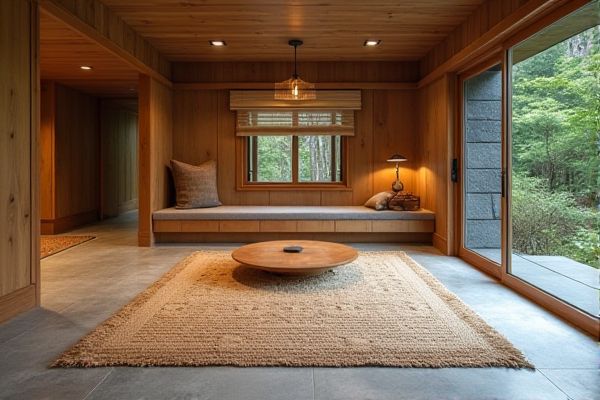
Cedar mats provide natural insulation and a warm, rustic aesthetic, while stone mats offer superior durability and heat resistance for high-traffic or outdoor areas. Explore the benefits and best uses of each to determine which option suits Your space perfectly.
Table of Comparison
| Feature | Cedar Mat | Stone Mat |
|---|---|---|
| Material | Natural cedar wood | Durable stone (granite, slate) |
| Durability | Moderate, prone to weathering | High, weather-resistant |
| Weight | Lightweight, easy to move | Heavy, requires stable surface |
| Maintenance | Regular sealing recommended | Low maintenance, easy to clean |
| Comfort | Soft, natural warmth | Hard, cold surface |
| Eco-friendliness | Biodegradable, renewable | Natural but non-renewable extraction |
| Typical Use | Indoor/outdoor mats, decorative | Outdoor entry mats, heavy traffic areas |
| Price Range | Moderate cost | Higher cost |
Introduction to Cedar Mat and Stone Mat
Cedar mats consist of thinly sliced cedar wood strips woven into flexible mats, prized for their natural aroma, moisture resistance, and insect-repellent properties. Stone mats are crafted from interlocking stone or slate pieces, offering superior durability, heat resistance, and an elegant, natural aesthetic for outdoor or indoor use. Both materials serve functional and decorative purposes, but cedar mats excel in lightweight, aromatic applications, while stone mats provide robust, long-lasting surface solutions.
Material Composition: Cedar Mat vs Stone Mat
Cedar mats are crafted from natural cedar wood fibers, known for their aromatic properties, durability, and resistance to moisture and insects, making them ideal for outdoor use or decorative purposes. Stone mats consist of natural or synthetic stone particles bound together with strong adhesives, providing high durability, heat resistance, and a sturdy, slip-resistant surface suitable for heavy-duty applications. The choice between cedar mats and stone mats depends on the desired texture, environmental exposure, and functional requirements such as comfort and toughness.
Durability and Longevity Comparison
Cedar mats offer moderate durability with natural resistance to rot and insect damage, maintaining structural integrity for several years under typical conditions. Stone mats provide superior longevity due to their composition of robust mineral materials, resisting weathering, wear, and environmental stress much longer than organic alternatives. When comparing durability, stone mats excel in harsh climates and high-traffic areas, while cedar mats benefit from biodegradability and aesthetic appeal but may require more frequent replacement.
Aesthetic Appeal and Design Options
Cedar mats offer a warm, natural aesthetic with rich textures and earthy tones that complement rustic or organic design schemes. Stone mats provide a sleek, modern look with smooth surfaces and a wide range of colors, ideal for contemporary or minimalist interiors. Your choice depends on whether you prefer the inviting, tactile charm of cedar or the clean, polished allure of stone to enhance your space's design.
Comfort and User Experience
Cedar mats provide superior comfort due to their natural, smooth texture and subtle aromatic properties that enhance relaxation during use. Stone mats, while durable and effective for acupressure benefits, often feel harder and less comfortable for extended periods. Users seeking a soothing and soft surface typically prefer cedar mats for an elevated sensory experience.
Maintenance and Cleaning Requirements
Cedar mats require regular brushing and occasional hosing to remove dirt and prevent mold, benefiting from the wood's natural oils that resist rot and pests. Stone mats demand less frequent cleaning, often needing only a rinse or sweep to maintain appearance, thanks to their durable, non-porous surface that resists stains and mildew. Your choice depends on whether you prefer low-maintenance durability with stone or the natural aesthetic and moderate upkeep of cedar.
Slip Resistance and Safety Features
Cedar mats provide natural slip resistance due to their textured wood surface and excellent water absorption properties, making them ideal for wet environments. Stone mats, often made from materials like granite or marble, offer durable slip resistance through their rough surface textures and chemical treatments that enhance grip. Both mats contribute to safety by reducing the risk of slips and falls, but cedar mats excel in environments requiring eco-friendly, non-toxic solutions.
Environmental Impact and Sustainability
Cedar mats are biodegradable and sourced from renewable timber, contributing to reduced carbon footprints and minimal landfill waste compared to stone mats, which rely on mined, non-renewable materials with higher energy consumption during production. The natural properties of cedar mats support sustainable forestry when harvested responsibly, while stone mats involve extensive quarrying that disrupts ecosystems and causes habitat destruction. Utilizing cedar mats promotes carbon sequestration and soil health, whereas stone mats offer limited ecological benefits and generate more long-term environmental impact.
Installation and Placement Tips
Cedar mats offer easier installation due to their lightweight design and flexible structure, allowing placement on uneven surfaces without additional support. Stone mats require a solid, level base such as concrete or compacted gravel to prevent shifting or cracking over time. For optimal durability, position cedar mats in shaded, dry areas to minimize weathering, while stone mats benefit from proper drainage systems to avoid water pooling and erosion.
Cost Analysis: Cedar Mat vs Stone Mat
Cedar mats typically cost less upfront than stone mats, making them a budget-friendly option for landscaping or garden paths. Stone mats, while more expensive initially, offer longer durability and require less maintenance, potentially lowering your long-term expenses. Evaluating your project size and lifespan expectations will help determine which investment aligns better with your financial goals.
 homyna.com
homyna.com